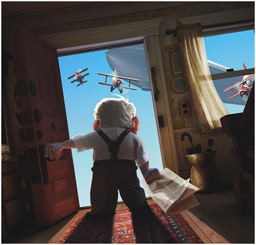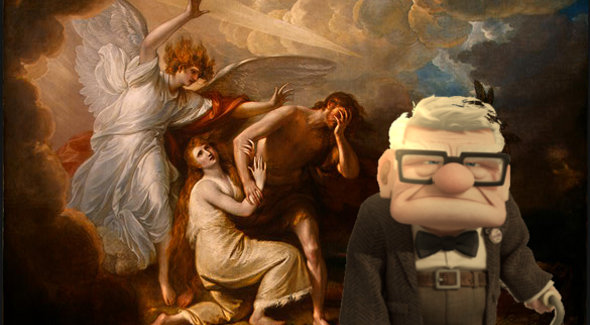The Limits of Common Sense, or, Why One Might Tie Ten Thousand Balloons to One’s House

Common sense: Always use biplanes when attacking the elderly at home. The extra lift and maneuverability is worth the loss in speed. Zeppelins are also good.
“Therefore what he gives . . . to man in part
Spiritual, may of purest Spirits be found
No ingrateful food: and food alike those pure
Intelligential substances require
As doth your Rational; and both contain
Within them every lower facultie
Of sense, whereby they hear, see, smell, touch, taste,
Tasting concoct, digest, assimilate,
And corporeal to incorporeal turn.
For know, whatever was created, needs
To be sustaind and fed.”
– John Milton, Paradise Lost, Book V
“What now?” is about where common sense breaks down. Once the point is gone, reason is often soon to follow. Fight Club hits that mark as well as anybody, when Tyler and the narrator discuss meeting their fathers and asking what they should do with their lives. But Fight Club is one of those pieces that offers problems, but not solutions. Pieces that really tackle “What now?” make progress – they manage to advance against that intractable question.
I’ve talked a lot recently on the blog about how art is about what things mean, and that no field but art gives meanings to things. Explanations, sure, analysis, sure, forecasts, hypotheses, classifications, terminologies, even values, granted. But meaning lives in the experiential, subjective space on both sides of our senses, and it is much easier to create it or demonstrate it – through art – than it is to discuss it systematically. Discuss meaning systematically without incorporating art, and you run into a lot of brick walls (See? “Brick Wall” means something, and that turn of phrase was more artsy than substantive).
A fancy way to talk about the limitations of common sense is to start talking about “dialectic.” Talk about the rules, restrictions and mutual assumptions that people share when they start arguing about things. Talk about how any framework for explaining something always suffers from internal interference, contradiction or limitation. If all your discourse comes in the form of argument between two viewpoints, you will have imported into your understanding of the world the idea that things have two sides, which is just an invention. It’s not true.

Check out http://www.alexnolan.net/articles/ufophotos.htm to find out how this picture was faked.
It’s like seeing the strings on the port nacelle of the Enterprise and assuming they’re “space wires” – or when a camera gets hit by the light just so that its own parts reflect on the film, creating a ghosted image that people assume is a UFO. It isn’t missing the forest for the trees, it’s missing the forest for the binoculars.
Epistemology stultifies discourse, and so many arguments devolve into semantic squabbles, that it often seems hopeless to try to make headway against the “What now?” question. Come up with an answer, somebody will shoot it down – or you’ll have to shoot it down yourself. If you think you have your handle on something that cracks it, you’re probably just either begging the question or falling for a trick of the light, because it isn’t really crackable. It’s not a problem to be solved – even saying that introduces confounding dialectical elements.
But art, art can attack it, because art gets to play with epistemological limits in ways that more strictly constrained dialectical discourse cannot – provided the artists have sufficient facility and skill, and, most importantly, the necessary subtlety and specificity. When wandering into this sort of territory, demanding easy or vague answers is a sure way to hold up any progress (and also to undermine the efforts of artists to broaden overall human experience, and also to miss out on a lot of cool stuff).
Milton was marvelous at this. Whenever I read Milton, I feel like I’m making progress against areas of ignorance. Not mapping them, mind you, but progressing. Once you get to a certain point in adult intellectual life, a lot of the best stuff gets stuck around the margins.
Up also does this well – and, again I want to resist laundry listing similarities, because I really think is essential to how the two pieces work, to understanding how Up functions as a piece of art, and to get the most out of watching Up. So perhaps I will pull in another work of art as contrast.
Up gets close to what I like to call (and/or just coined – you be the judge!) the “Theoden trap,” named after the King of Rohan in the Lord of the Rings.

Bravo.
What more can I say?
Overthinkinit.com: Pop Cultures answer to Rinzai Zen.
@Michael Williams
One thing I have always kind of exasperatedly yelled at people (which is probably why they don’t listen) is that you don’t have to get all orientalist for this kind of thinking. There are rich traditions of this sort in all cultures – there is nothing new under the sun.
I think that defying the notion that the people and culture who do cool things are people and cultures other than you and yours is one of my major motivations in writing for Overthinking It.
Well, that and the ladies. I do it for the ladies.
Yes of course. You need not go Said on me.
However, the severity of analysis does from time to time border on the Koan-like imho.
Tit for tat aside.
Who’s leg do you have to hump to get some McLuhan fused analysis around here?
I have yet to see Up myself, but just one viewing of the trailer was enough to solidify my opinion that whatever sandbox Pixar decides to play in, the end result will invariably touch upon that deep part of the human condition that, as you said, only art is able to express (or reflect). It’s funny how a metaphor- by definition an indirect representation of something else- is often the most effective means of conveying truth. Thank you for writing this, Fenzel. I now have something more to ponder on my way out of the theater when I finally have the time to see this masterpiece.
And there are still piles of snob critics out there who don’t believe anything with the name Disney (even adding Pixar) on it can be any good, or contain any serious ideas. This should start to show them.
Best final fantasy reference ever?
Up was incredible. Your analysis has some great stuff, particularly about epistemology stunting discourse, and art being a language unto itself. I completely agree, but your conclusion feels like a cop-out. If we are to subside and let the art speak for itself, then why bother writing to begin with – only to say ‘look out for these themes and see it for yourself’? I believe ideas have to be realized for each person, that the infectiousness of a truth is not contingent solely on just how much sense it makes. And so I agree that a person ought to experience a work of art in his or her own time and feel what truth is appropriate to his or her biography and present.
So why write? Personally, I write because I feel that art is being mistreated, that the masses’ approach to art is inappropriate to the art (although much art is being adapted for appropriateness to the common approach). If you have a feeling or idea, a response to Up, treat it purely. Your subjective response is in itself its own work of art, and I can learn from it. I feel as though you’re holding back.
I’m being very nitpicky though. Your thoughts are a pleasure to read, and you’ve made me want to read Paradise Lost. I’m ignorant to Milton’s work, so because of this, I at least now have interest. Thanks for the stimulating read, this strikes me as being unlike any other place writing about movies, and I think you’ve got a reader in me now.
I know nothing about Milton’s Paradise, but I found this review to be one of the most insightful ones online about Pixar’s UP. And I should know, because I scoured the web for information on UP in order to prepare for writing my own review. You can read it here.
The Spirit of Pixar’s UP
I decided to copy your style by including quotes in my review from a classic work, but in my case it is “Romeo and Juliet”. I elaborated on your Adam and Eve theme and suggested that this is A&E in reverse. Where the protagonist is heading toward the Garden of Eden instead of being thrown out of it. I also compared the story to Don Quixote and the Wizard of Oz.
I hope you get a chance to read my review and comment on it.
Yes. Best Final Fantasy reference,… well not ever but in a damn long while. I actually had to cover my mouth to quiet the horrible giggling that friggin’ picture caption got out of me, for fear of waking up other people in my house.